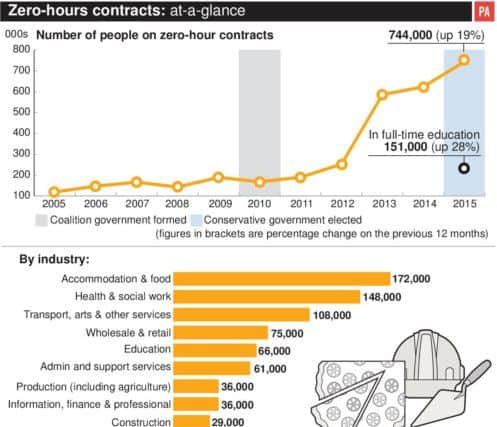Infographic: ‘Two-tier workforce’ as zero-hours contracts spiral


People on a zero-hours contract in their main job represented 2.4% of those in employment in April-June, compared with the same period last year, the Office for National Statistics said.
The ONS estimated there were around 1.5 million contracts that do not guarantee a minimum number of hours, confirming that many workers are on more than one zero-hours contract.
Advertisement
Hide AdAdvertisement
Hide AdThe figure, for January, is 91,000 higher than the same month last year.


The new figures fuelled fresh controversy over the use of the contracts, under which employees do not know how much work they have from one week to the next.
Research published by the TUC shows that average weekly earnings for zero-hours workers are £188, compared with £479 for permanent workers.
Two-fifths of zero-hours workers earn less than £111 a week - the qualifying threshold for statutory sick pay - compared with one in 12 permanent employees.
Advertisement
Hide AdAdvertisement
Hide AdTUC general secretary Frances O’Grady said: “Zero-hours contracts are a stark reminder of Britain’s two-tier workforce.
“People employed on these contracts earn £300 a week less, on average, than workers in secure jobs.
“I challenge any minister or business leader to survive on a low-paid zero-hours contract job, not knowing from one day to the next how much work they will have.”
A Business Department spokesman said: “Zero-hours contracts have a part to play in a modern, flexible labour market.
Advertisement
Hide AdAdvertisement
Hide Ad“For workers such as students and those with caring responsibilities they provide a pathway to employment, particularly when the individual cannot commit to regular hours.
“However we have acted to ban the use of exclusivity clauses in these contracts which prevent people from boosting their income when they have no guarantee of work.
“This is giving working people the freedom to take other work opportunities and more control over their work hours and income.”
Unite assistant general secretary Steve Turner said: “The continued rise of zero-hours contracts underlines how Government claims to be on the side of working people are nothing more than lip service.
Advertisement
Hide AdAdvertisement
Hide Ad“These figures are the tip of an insecure iceberg - they do not include short-hours contracts and the wider rise in insecure, precarious work across the economy.”
ZERO-HOURS CONTRACTS BY THE NUMBERS
Here are some of the main figures on zero-hours contracts in the UK:
• The number of people on zero-hours contracts is up 19%, from 624,000 in April to June 2014 to 744,000 in April to June 2015.
• 2.4% of workers in the UK were on zero-hours contracts between April and June 2015 - up from 2.3% on the same period 12 months earlier.
Advertisement
Hide AdAdvertisement
Hide Ad• Around one in 15 16 to 24-year-olds in employment are estimated to be on a zero-hours contract. This is up from one in 16 in 2014, and is the biggest rise for any age group.
• 3.6% of people aged 65 and over in employment are estimated to be on a zero-hours contract - the second highest percentage after 16 to 24-year-olds.
• More women than men are estimated to be on zero-hours contracts: roughly three in 100 workers compared with two in 100.
• The West Midlands is the region in England with the highest estimated percentage of workers on zero-hours contracts, at 3.1%. Yorkshire and Humber has the lowest with 2.1%.
Advertisement
Hide AdAdvertisement
Hide Ad• Scotland is estimated to have 1.9% of its workforce on zero-hours contracts, while Wales has 2.8%. There is no reliable estimate for Northern Ireland. The overall figure for England is 2.5%.
• Roughly one in 10 people working in the accommodation and food industries are on zero-hours contracts - the highest for any sector. The next largest percentage is estimated to be for admin and support services, where one in every 24 are on zero-hours contracts.
• People on zero-hours contracts usually work around 25 hours a week - down from 26 on last year. This compares with an average of 37 hours for everyone in employment.
• One fifth (20.3%) of people on a zero-hours contract are in full-time education. This is up from 18.9% on the year.
Advertisement
Hide AdAdvertisement
Hide Ad• Slightly more people born outside the UK (3%) than in the UK (2.3%) are employed in this country on a zero-hours contract.
• Over half of people (59%) on zero-hours contracts do not want more hours. Just under a quarter (24%) say they want more hours in their current job.